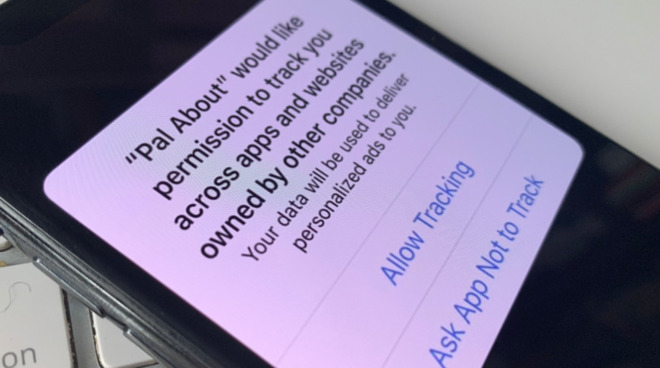Apple anti-tracking privacy feature starting to show up in iOS 14.4 beta
Apple's anti-tracking privacy feature is starting to show up for users running the first beta version of the company's upcoming iOS 14.4 update.

Credit: AppleInsider
The privacy feature makes a specific type of user tracking meant for advertisers opt-in by default. That means apps will need to explicitly ask users for permission to track them across other sites and apps.
According to users on the MacRumors forum, the permission popup box has started to appear in iOS 14.4 beta 1, which was seeded to registered developers on Dec. 16.
One user posted a screenshot of the NBA app asking to track their activity in the beta. The prompt also displays the customizable text that developers will be able to change. In the NBA app's case, it says that user data "will be used to provide [them] with a better and personalized ad experience."
Although initially planned to launch with iOS 14, Apple delayed the feature to give developers and advertisers more time to prepare. Currently, it's slated to debut in early 2021.
Based on the current beta testing timeline, it's likely that iOS 14.4 and the privacy feature could debut in January or February.
Some businesses reliant on advertising revenue have come out against the privacy feature. Most notably, Facebook earlier in December ran full-page ads calling the default opt-out option a threat to small and medium businesses.
Other groups, like Mozilla and the Electronic Frontier Foundation, have voiced their support for the feature.
Credit: AppleInsider
The privacy feature makes a specific type of user tracking meant for advertisers opt-in by default. That means apps will need to explicitly ask users for permission to track them across other sites and apps.
According to users on the MacRumors forum, the permission popup box has started to appear in iOS 14.4 beta 1, which was seeded to registered developers on Dec. 16.
One user posted a screenshot of the NBA app asking to track their activity in the beta. The prompt also displays the customizable text that developers will be able to change. In the NBA app's case, it says that user data "will be used to provide [them] with a better and personalized ad experience."
Although initially planned to launch with iOS 14, Apple delayed the feature to give developers and advertisers more time to prepare. Currently, it's slated to debut in early 2021.
Based on the current beta testing timeline, it's likely that iOS 14.4 and the privacy feature could debut in January or February.
Some businesses reliant on advertising revenue have come out against the privacy feature. Most notably, Facebook earlier in December ran full-page ads calling the default opt-out option a threat to small and medium businesses.
Other groups, like Mozilla and the Electronic Frontier Foundation, have voiced their support for the feature.

Comments
Facebook boardroom: “Well, yes, you can ask …”
Ads and having to avoid or block them is incredibly irritating and time consuming.
It’s also really creepy seeing ads for things I just looked at someplace… sometimes only seconds afterward.
So, I make it a point to NEVER, EVER click on ads or even click on search results marked as ads.
I don’t know if anyone has experienced this, but several times my wife and I have been having a discussion about something and ads will appear for those things almost instantly. That’s freaky!
In theory… yes, it is possible to prevent all forms of tracking.
In practice… no, it is not possible to prevent all forms of tracking.
The difference between theory and practice comes down to the parameters. A nerd like me could easily do a lot to prevent tracking, especially if I short-term want to stay anonymous for a particular purpose; but once you scale up to include living a normal modern lifestyle, and millions of users, things start to get really really really complicated. Especially since a lot of tracking and coordination of our data happens server-side; so once you identify yourself somewhere, a lot of tracking can start to happen even if your device technically, by itself, doesn't reveal anything trackable.
2. You don't seem to understand a thing about LockDownPrivacy. Their invasive tracking-blocker doesn't send any data through their servers (so there's nothing to log), it also blocks trackers from within apps on your phone (so not just a content blocker for the web browser); and it is completely free.
There is the https://appleinsider.com/privacy-page, of course; but that's mostly just the old "by reading this you've already consented"-approach to legalese.
So, yeah, confirmed that there's a bunch of cookies/trackers.
In US stealing and selling private data is something normal. It's time to use EU search engines and to stop visiting pages like this one.